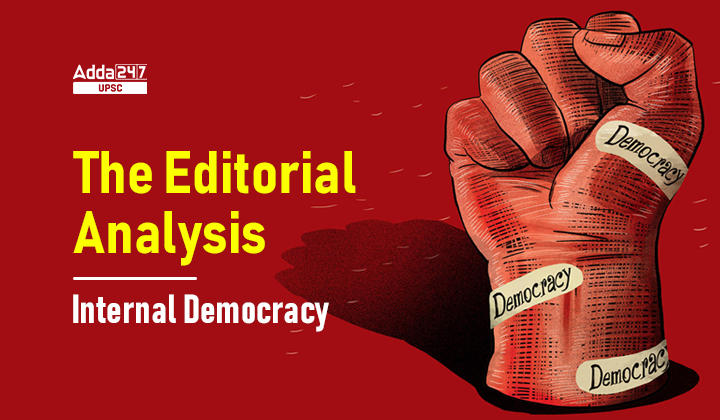Table of Contents
Internal Democracy- Relevance for UPSC Exam
- GS Paper 2: Governance, Administration and Challenges
- Government policies and interventions for development in various sectors and issues arising out of their design and implementation.
Internal Democracy in News
- The Election Commission of India (ECI) has rejected the idea of a ‘permanent president’ for a party, while taking issue with the Yuvajana Shramika Rythu Congress Party (YSRCP), which rules Andhra Pradesh.
- The party reportedly elected Chief Minister Y.S. Jagan Mohan Reddy as its president for life in July 2022.
ECI’s View on Internal Democracy
- The ECI says the idea of a ‘permanent president’ for a party is inherently anti-democratic.
- There is merit in the ECI’s view and its insistence on internal democracy, as no individual should be elected leader for life.
- Any party that participates in a democratic process, and wants to govern and legislate, should include formal and periodic election of office-bearers as part of the way it functions as an association.
- The ECI has periodically used guidelines issued for registration of parties under Section 29A of the Representation of the People Act, 1951 to remind parties to conduct elections and to ensure that their leadership is renewed, changed or re-elected every five years.
Main Type of Political Parties in India
Indian political parties are of myriad kinds — some, such as-
- Ideologically Driven Parties: Bharatiya Janata Party or the Communist parties, are structured, cadre-based organisations that function towards an ideological goal or a principle;
- Liberal Parties: the Congress, are more loosely structured collections of individuals with even different strands of opinion but functioning within an association that has core ideals;
- Regional Parties: They reflect social or regional cleavages of Indian society.
Reasons for Emergence of One Man Dominated Party
- Fragmentation of Indian Polity: the fragmentation of India’s polity into a federalised, multi-party system has also given way to domination by “charismatic” individuals or their families.
- This has happened mainly because of the nature of support that these parties enjoy or due to their financing structures which necessitates centralised control by a single coterie or a family.
- Absence of Meaningful Internal Democracy: several political parties today do not insist on thoroughgoing internal elections to secure their leadership.
- Even if they do conduct polls, they lack sufficient contestation and are done to reaffirm the dominance of the high command.
- In some cases, with electoral politics being a zero-sum game, political parties are loath to allow internal contest, fearing that this could foster disunity, as opposed to nomination and consensus-building on leadership.
- Lack of Substantive Power of ECI: the election commission does not have any statutory power to enforce internal democracy in parties or to mandate elections.
- The lack of such substantive power only leads to parties carrying out the ECI’s edicts in a mechanical manner.
Conclusion
- With dynasticism and a lack of internal democracy becoming a matter of public debate, perhaps public pressure would finally bear upon parties to do the right thing.
Election Commission of India (ECI)




 TSPSC Group 1 Question Paper 2024, Downl...
TSPSC Group 1 Question Paper 2024, Downl...
 TSPSC Group 1 Answer key 2024 Out, Downl...
TSPSC Group 1 Answer key 2024 Out, Downl...
 UPSC Prelims 2024 Question Paper, Downlo...
UPSC Prelims 2024 Question Paper, Downlo...




